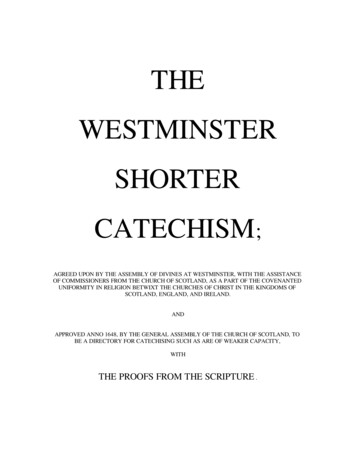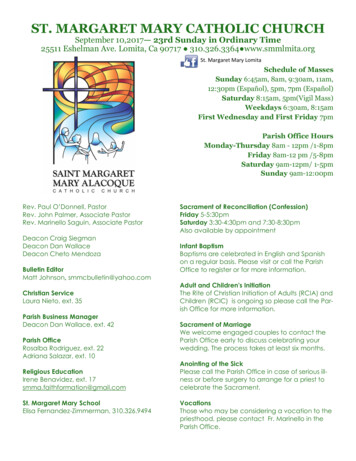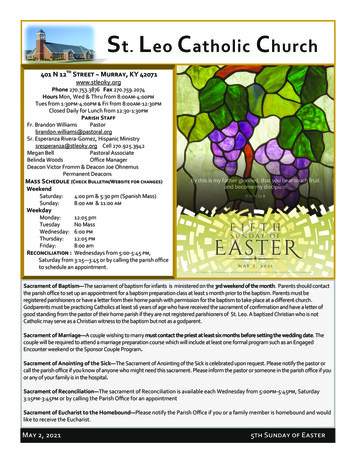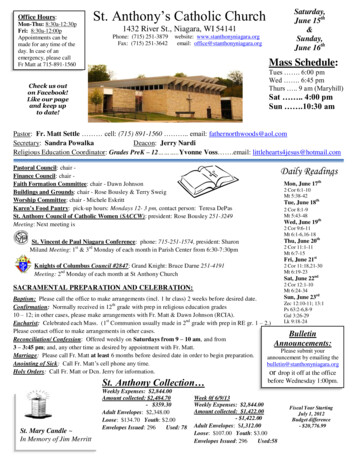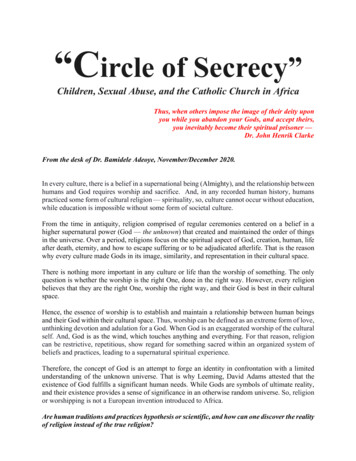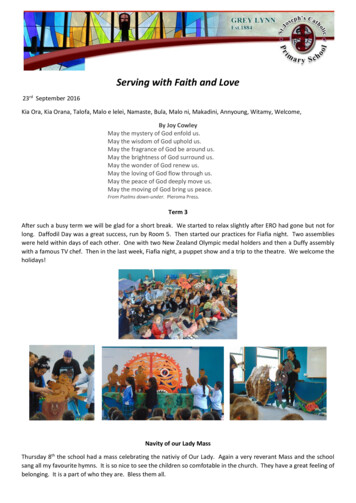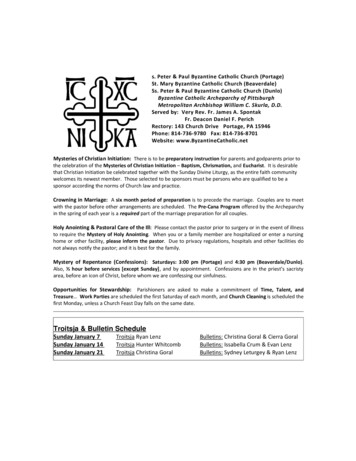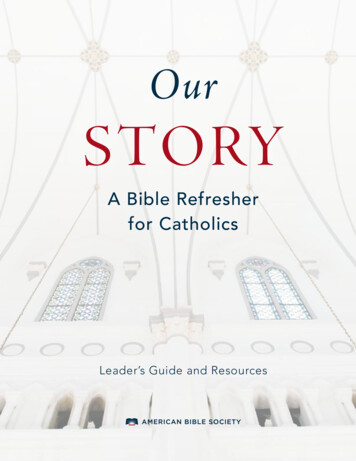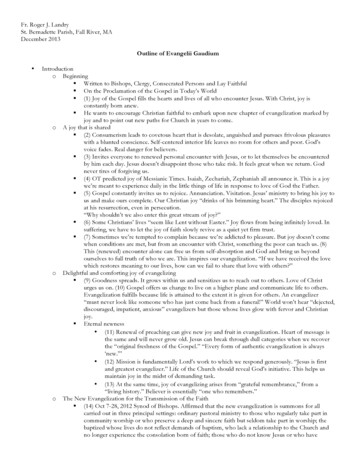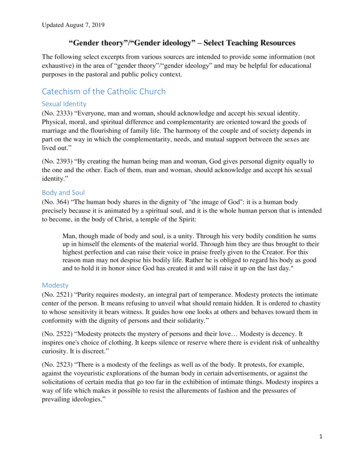
Transcription
Updated August 7, 2019“Gender theory”/“Gender ideology” – Select Teaching ResourcesThe following select excerpts from various sources are intended to provide some information (notexhaustive) in the area of “gender theory”/“gender ideology” and may be helpful for educationalpurposes in the pastoral and public policy context.Catechism of the Catholic ChurchSexual Identity(No. 2333) “Everyone, man and woman, should acknowledge and accept his sexual identity.Physical, moral, and spiritual difference and complementarity are oriented toward the goods ofmarriage and the flourishing of family life. The harmony of the couple and of society depends inpart on the way in which the complementarity, needs, and mutual support between the sexes arelived out.”(No. 2393) “By creating the human being man and woman, God gives personal dignity equally tothe one and the other. Each of them, man and woman, should acknowledge and accept his sexualidentity.”Body and Soul(No. 364) “The human body shares in the dignity of "the image of God": it is a human bodyprecisely because it is animated by a spiritual soul, and it is the whole human person that is intendedto become, in the body of Christ, a temple of the Spirit:Man, though made of body and soul, is a unity. Through his very bodily condition he sumsup in himself the elements of the material world. Through him they are thus brought to theirhighest perfection and can raise their voice in praise freely given to the Creator. For thisreason man may not despise his bodily life. Rather he is obliged to regard his body as goodand to hold it in honor since God has created it and will raise it up on the last day.”Modesty(No. 2521) “Purity requires modesty, an integral part of temperance. Modesty protects the intimatecenter of the person. It means refusing to unveil what should remain hidden. It is ordered to chastityto whose sensitivity it bears witness. It guides how one looks at others and behaves toward them inconformity with the dignity of persons and their solidarity.”(No. 2522) “Modesty protects the mystery of persons and their love Modesty is decency. Itinspires one's choice of clothing. It keeps silence or reserve where there is evident risk of unhealthycuriosity. It is discreet.”(No. 2523) “There is a modesty of the feelings as well as of the body. It protests, for example,against the voyeuristic explorations of the human body in certain advertisements, or against thesolicitations of certain media that go too far in the exhibition of intimate things. Modesty inspires away of life which makes it possible to resist the allurements of fashion and the pressures ofprevailing ideologies.”1
Updated August 7, 2019Privacy(No. 1907) “First, the common good presupposes respect for the person as such. In the name of thecommon good, public authorities are bound to respect the fundamental and inalienable rights of thehuman person. Society should permit each of its members to fulfill his vocation. In particular, thecommon good resides in the conditions for the exercise of the natural freedoms indispensable forthe development of the human vocation, such as ‘the right to act according to a sound norm ofconscience and to safeguard . . . privacy, and rightful freedom also in matters of religion.’”Mutilation(No. 2297) “Except when performed for strictly therapeutic medical reasons, directly intendedamputations, mutilations, and sterilizations performed on innocent persons are against the morallaw.”Full textPope FrancisEncyclical letter Laudato Si’ (2015)(No. 155) “Human ecology also implies another profound reality: the relationship between humanlife and the moral law, which is inscribed in our nature and is necessary for the creation of a moredignified environment. Pope Benedict XVI spoke of an ‘ecology of man’, based on the fact that‘man too has a nature that he must respect and that he cannot manipulate at will’. It is enough torecognize that our body itself establishes us in a direct relationship with the environment and withother living beings. The acceptance of our bodies as God’s gift is vital for welcoming and acceptingthe entire world as a gift from the Father and our common home, whereas thinking that we enjoyabsolute power over our own bodies turns, often subtly, into thinking that we enjoy absolute powerover creation. Learning to accept our body, to care for it and to respect its fullest meaning, is anessential element of any genuine human ecology. Also, valuing one’s own body in its femininity ormasculinity is necessary if I am going to be able to recognize myself in an encounter with someonewho is different. In this way we can joyfully accept the specific gifts of another man or woman, thework of God the Creator, and find mutual enrichment. It is not a healthy attitude which would seekto cancel out sexual difference because it no longer knows how to confront it.”Full textApostolic Exhortation Amoris Laetitia (March 19, 2016)(No. 56) “Yet another challenge is posed by the various forms of an ideology of gender that ‘deniesthe difference and reciprocity in nature of a man and a woman and envisages a society withoutsexual differences, thereby eliminating the anthropological basis of the family. This ideology leadsto educational programs and legislative enactments that promote a personal identity and emotionalintimacy radically separated from the biological difference between male and female. Consequently,human identity becomes the choice of the individual, one which can also change over time.’ It is asource of concern that some ideologies of this sort, which seek to respond to what are at timesunderstandable aspirations, manage to assert themselves as absolute and unquestionable, evendictating how children should be raised. It needs to be emphasized that ‘biological sex and thesocio-cultural role of sex (gender) can be distinguished but not separated.’ It is one thing to beunderstanding of human weakness and the complexities of life, and another to accept ideologies thatattempt to sunder what are inseparable aspects of reality. Let us not fall into the sin of trying to2
Updated August 7, 2019replace the Creator. We are creatures, and not omnipotent. Creation is prior to us and must bereceived as a gift. At the same time, we are called to protect our humanity, and this means, in thefirst place, accepting it and respecting it as it was created.”(No. 285) “Beyond the understandable difficulties which individuals may experience, the youngneed to be helped to accept their own body as it was created, for ‘thinking that we enjoy absolutepower over our own bodies turns, often subtly, into thinking that we enjoy absolute power overcreation An appreciation of our body as male or female is also necessary for our own selfawareness in an encounter with others different from ourselves. In this way we can joyfully acceptthe specific gifts of another man or woman, the work of God the Creator, and find mutualenrichment.’ Only by losing the fear of being different, can we be freed of self-centeredness andself-absorption. Sex education should help young people to accept their own bodies and to avoid thepretension ‘to cancel out sexual difference because one no longer knows how to deal with it.’(No. 286) “Nor can we ignore the fact that the configuration of our own mode of being, whether asmale or female, is not simply the result of biological or genetic factors, but of multiple elementshaving to do with temperament, family history, culture, experience, education, the influence offriends, family members and respected persons, as well as other formative situations. It is true thatwe cannot separate the masculine and the feminine from God’s work of creation, which is prior toall our decisions and experiences, and where biological elements exist which are impossible toignore. But it is also true that masculinity and femininity are not rigid categories. It is possible, forexample, that a husband’s way of being masculine can be flexibly adapted to the wife’s workschedule. Taking on domestic chores or some aspects of raising children does not make him anyless masculine or imply failure, irresponsibility or cause for shame. Children have to be helped toaccept as normal such healthy ‘exchanges’ which do not diminish the dignity of the father figure. Arigid approach turns into an over accentuation of the masculine or feminine, and does not helpchildren and young people to appreciate the genuine reciprocity incarnate in the real conditions ofmatrimony. Such rigidity, in turn, can hinder the development of an individual’s abilities, to thepoint of leading him or her to think, for example, that it is not really masculine to cultivate art ordance, or not very feminine to exercise leadership. This, thank God, has changed, but in someplaces deficient notions still condition the legitimate freedom and hamper the authenticdevelopment of children’s specific identity and potential.”Full textAddress to Priests, Religious, Seminarians and Pastoral Workers during the ApostolicJourney to Georgia and Azerbaijan (October 1, 2016)“You, Irina, mentioned a great enemy to marriage today: the theory of gender. Today there is aworld war to destroy marriage. Today there are ideological colonizations which destroy, not withweapons, but with ideas. Therefore, there is a need to defend ourselves from ideologicalcolonizations.”Full textAddress to the Polish Bishops during the Apostolic Journey to Poland (July 27, 2016)“In Europe, America, Latin America, Africa, and in some countries of Asia, there are genuine formsof ideological colonization taking place. And one of these - I will call it clearly by its name – is [theideology of] ‘gender’. Today children – children! – are taught in school that everyone can choose3
Updated August 7, 2019his or her sex. Why are they teaching this? Because the books are provided by the persons andinstitutions that give you money. These forms of ideological colonization are also supported byinfluential countries. And this terrible!“In a conversation with Pope Benedict, who is in good health and very perceptive, he said to me:‘Holiness, this is the age of sin against God the Creator’. He is very perceptive. God created manand woman; God created the world in a certain way and we are doing the exact opposite. Godgave us things in a ‘raw’ state, so that we could shape a culture; and then with this culture, we areshaping things that bring us back to the ‘raw’ state! Pope Benedict’s observation should make usthink. ‘This is the age of sin against God the Creator’. That will help us.”Full textAddress to Équipes de Notre Dame (September 10, 2015)“This mission which is entrusted to them, is all the more important inasmuch as the image of thefamily — as God wills it, composed of one man and one woman in view of the good of the spousesand also of the procreation and upbringing of children — is deformed through powerful adverseprojects supported by ideological trends.”Full textAddress to the Bishops of Puerto Rico (June 8, 2015)“The complementarity of man and woman, the pinnacle of divine creation, is being questioned bythe so-called gender ideology, in the name of a more free and just society. The differences betweenman and woman are not for opposition or subordination, but for communion and generation, alwaysin the ‘image and likeness’ of God.”Full textGeneral Audience on Man and Woman (April 15, 2015)“For example, I ask myself, if the so-called gender theory is not, at the same time, an expression offrustration and resignation, which seeks to cancel out sexual difference because it no longer knowshow to confront it. Yes, we risk taking a step backwards. The removal of difference in fact creates aproblem, not a solution.”Full textAddress in Naples (March 23, 2015)“The crisis of the family is a societal fact. There are also ideological colonializations of the family,different paths and proposals in Europe and also coming from overseas. Then, there is the mistakeof the human mind — gender theory — creating so much confusion.”Full textMeeting with Families in Manila (January 16, 2015)“Let us be on guard against colonization by new ideologies. There are forms of ideologicalcolonization which are out to destroy the family.”Full text4
Updated August 7, 2019Pope Benedict XVIEncyclical letter Deus Caritas Est (2005)(No. 5) “Yet the contemporary way of exalting the body is deceptive. Eros, reduced to pure ‘sex’,has become a commodity, a mere ‘thing’ to be bought and sold, or rather, man himself becomes acommodity. This is hardly man’s great ‘yes’ to the body. On the contrary, he now considers hisbody and his sexuality as the purely material part of himself, to be used and exploited at will.”(No. 11) “While the biblical narrative does not speak of punishment, the idea is certainly presentthat man is somehow incomplete, driven by nature to seek in another the part that can make himwhole, the idea that only in communion with the opposite sex can he become ‘complete’ Eros issomehow rooted in man's very nature; Adam is a seeker, who ‘abandons his mother and father’ inorder to find woman; only together do the two represent complete humanity and become ‘oneflesh’. The second aspect is equally important. From the standpoint of creation, eros directs mantowards marriage, to a bond which is unique and definitive; thus, and only thus, does it fulfil itsdeepest purpose. Corresponding to the image of a monotheistic God is monogamous marriage.”Full textAddress to the Pontifical Council “Cor Unum” (January 19, 2013)“The Christian vision of man is, in fact, a great ‘yes’ to the dignity of persons called to an intimatefilial communion of humility and faithfulness. The human being is not a self-sufficient individualnor an anonymous element in the group. Rather he is a unique and unrepeatable person, intrinsicallyordered to relationships and sociability. Thus the Church reaffirms her great ‘yes’ to the dignity andbeauty of marriage as an expression of the faithful and generous bond between man and woman,and her no to ‘gender’ philosophies, because the reciprocity between male and female is anexpression of the beauty of nature willed by the Creator.”Full textAddress to the Roman Curia (December 21, 2012)“These words lay the foundation for what is put forward today under the term ‘gender’ as a newphilosophy of sexuality. According to this philosophy, sex is no longer a given element of naturethat man has to accept and personally make sense of: it is a social role that we choose for ourselves,while in the past it was chosen for us by society. The profound falsehood of this theory and of theanthropological revolution contained within it is obvious. People dispute the idea that they have anature, given by their bodily identity, that serves as a defining element of the human being. Theydeny their nature and decide that it is not something previously given to them, but that they make itfor themselves.”Full textAddress to the German Bundestag (September 22, 2011)“ There is also an ecology of man. Man too has a nature that he must respect and that he cannotmanipulate at will. Man is not merely self-creating freedom. Man does not create himself. He isintellect and will, but he is also nature, and his will is rightly ordered if he respects his nature,listens to it and accepts himself for who he is, as one who did not create himself. In this way, and inno other, is true human freedom fulfilled.”Full text5
Updated August 7, 2019Pope St. John Paul IILetter to Families (1994)(No. 6) “Man is created ‘from the very beginning’ as male and female: the light of all humanity ismarked by this primordial duality. From it there derive the ‘masculinity’ and the ‘femininity’ ofindividuals, just as from it every community draws its own unique richness in the mutual fulfillmentof persons Hence one can discover, at the very origins of human society, the qualities ofcommunion and of complementarity.”(No. 19) “ the human family is facing the challenge of a new Manichaeanism, in which body andspirit are put in radical opposition; the body does not receive life from the spirit, and the spirit doesnot give life to the body. Man thus ceases to live as a person and a subject. Regardless of allintentions and declarations to the contrary, he becomes merely an object. This neo-Manichaeanculture has led, for example, to human sexuality being regarded more as an area for manipulationand exploitation than as the basis of that primordial wonder which led Adam on the morning ofcreation to exclaim before Eve: ‘This at last is bone of my bones and flesh of my flesh’ (Gen 2:23).”Full textTheology of the BodyPope John Paul II, Man and Woman He Created Them: A Theology of the Body, trans. MichaelWaldstein (Boston: Pauline Books & Media, 2006)(No. 9:3) “The account of the creation of man in Genesis 1 affirms from the beginning and directlythat man was created in the image of God inasmuch as he is male and female man became theimage of God not only through his own humanity, but also through the communion of persons,which man and woman form from the very beginning.”(No. 9:5) “Masculinity and femininity express the twofold aspect of man’s somatic constitution and indicate, in addition the new consciousness of the meaning of one’s body. This meaning, onecan say, consists in reciprocal enrichment.”(No. 10:1) “Femininity in some way finds itself before masculinity, while masculinity confirmsitself through femininity. Precisely the function of sex [that is, being male or female], which insome way is ‘constitutive for the person’ (not only ‘an attribute of the person’), shows how deeplyman, with all his spiritual solitude, with the uniqueness and unrepeatability proper to the person, isconstituted by the body as ‘he’ or ‘she’.”(No. 14:4) “The body, which expresses femininity ‘for’ masculinity and, vice versa, masculinity‘for’ femininity, manifests the reciprocity and the communion of persons.”Congregation for the Doctrine of the FaithLetter on the Collaboration of Men and Women in the Church and in the World (2004)(No. 2) “In this perspective [i.e., that of gender ideology], physical difference, termed sex, isminimized, while the purely cultural element, termed gender, is emphasized to the maximum andheld to be primary. The obscuring of the difference or duality of the sexes has enormousconsequences on a variety of levels. This theory of the human person, intended to promoteprospects for equality of women through liberation from biological determinism, has in reality6
Updated August 7, 2019inspired ideologies which, for example, call into question the family, in its natural two-parentstructure of mother and father, and make homosexuality and heterosexuality virtually equivalent, ina new model of polymorphous sexuality.”(No. 12) “Male and female are thus revealed as belonging ontologically to creation and destinedtherefore to outlast the present time, evidently in a transfigured form.”Full textPersona Humana: Declaration on Certain Questions Concerning Sexual Ethics (1975)(III) “ There can be no true promotion of man's dignity unless the essential order of his nature isrespected.”Full textCongregation for Catholic Education“Male and Female He Created Them”: Towards a Path of Dialogue on the Question ofGender Theory in Education (2019)(No. 1) “It is becoming increasingly clear that we are now facing with what might accurately becalled an educational crisis, especially in the field of affectivity and sexuality. In many places,curricula are being planned and implemented which “allegedly convey a neutral conception of theperson and of life, yet in fact reflect an anthropology opposed to faith and to right reason”. Thedisorientation regarding anthropology which is a widespread feature of our cultural landscape hasundoubtedly helped to destabilise the family as an institution, bringing with it a tendency to cancelout the differences between men and women, presenting them instead as merely the product ofhistorical and cultural conditioning.”** This entire document deals with gender theory and education. The above is the first paragraph.Full TextCompendium of the Social Doctrine of the Church(No. 224) “Faced with theories that consider gender identity as merely the cultural and socialproduct of the interaction between the community and the individual, independent of personalsexual identity without any reference to the true meaning of sexuality, the Church does not tire ofrepeating her teaching: ‘Everyone, man and woman, should acknowledge and accept his sexualidentity. Physical, moral and spiritual difference and complementarities are oriented towards thegoods of marriage and the flourishing of family life. . . .’ According to this perspective, it isobligatory that positive law be conformed to the natural law, according to which sexual identity isindispensable, because it is the objective condition for forming a couple in marriage” (emphasis inoriginal, internal citation omitted).Full textPontifical Council for the FamilyFamily, Marriage and “De Facto” Unions (2000)(No. 8) “In the process that could be described as the gradual cultural and human de-structuring ofthe institution of marriage, the spread of a certain ideology of ‘gender’ should not beunderestimated. According to this ideology, being a man or a woman is not determined7
Updated August 7, 2019fundamentally by sex but by culture. Therefore, the very bases of the family and inter-personalrelationships are attacked.”(No. 8) “Starting from the decade between 1960-1970, some theories hold not only that genericsexual identity (‘gender’) is the product of an interaction between the community and theindividual, but that this generic identity is independent from personal sexual identity: i.e., thatmasculine and feminine genders in society are the exclusive product of social factors, with norelation to any truth about the sexual dimension of the person. In this way, any sexual attitude canbe justified, including homosexuality, and it is society that ought to change in order to include othergenders, together with male and female, in its way of shaping social life.”Full textUSCCB: Various DocumentsChairmen Letter to U.S. Senators regarding ENDA Legislation (2013)“ENDA’s definition of ‘gender identity’ lends force of law to a tendency to view ‘gender as nothingmore than a social construct or psychosocial reality, which a person may choose at variance fromhis or her biological sex.”Full textENDA Backgrounder (2013)“ENDA defines ‘gender identity’ as ‘the gender-related identity, appearance, or mannerisms orother gender-related characteristics of an individual, with or without regard to the individual’sdesignated sex at birth.’”“ENDA’s treatment of ‘gender identity would lend the force of law to a tendency to view ‘gender’as nothing more than a social construct or psychosocial reality that can be chosen at variance fromone’s biological sex. Second, ENDA’s treatment of ‘gender identity’ would adversely affect theprivacy and associational rights of others. In this respect, ENDA would require workplace rules thatviolate the legitimate privacy expectations of other employees Third, ENDA would make it farmore difficult for organizations and employees with moral and religious convictions about theimportance of sexual difference, and the biological basis of sexual identity, to speak and act onthose beliefs.”Full textChairmen Statement on ENDA-style Executive Order (2014)“[The executive order] lends the economic power of the federal government to a deeply flawedunderstanding of human sexuality, to which faithful Catholics and many other people of faith willnot assent “The executive order prohibits ‘gender identity’ discrimination, a prohibition that is previouslyunknown at the federal level, and that is predicated on the false idea that ‘gender’ is nothing morethan a social construct or psychological reality that can be chosen at variance from one’s biologicalsex. This is a problem not only of principle but of practice, as it will jeopardize the privacy andassociational rights of both federal contractor employees and federal employees.”Full text8
Updated August 7, 2019Chairmen Statement on Department of Labor Regulations (2014)“The regulations published on December 3 [2014] by the U.S. Department of Labor implement theobjectionable Executive Order that President Obama issued in July to address what theAdministration has described as ‘sexual orientation’ and ‘gender identity’ discrimination inemployment by federal contractors. . . . [T]he regulations advance the false ideology of ‘genderidentity,’ which ignores biological reality and harms the privacy and associational rights of bothcontractors and their employees.”Full textChairmen Statement on the Violence Against Women Reauthorization Act (2013)“Unfortunately, we cannot support the version of the ‘Violence Against Women ReauthorizationAct of 2013’ passed by the House of Representatives and the Senate (S. 47) because of certainlanguage it contains. Among our concerns are those provisions in S. 47 that refer to ‘sexualorientation’ and ‘gender identity.’ All persons must be protected from violence, but codifying theclassifications ‘sexual orientation’ and ‘gender identity’ as contained in S. 47 is problematic. Thesetwo classifications are unnecessary to establish the just protections due to all persons. Theyundermine the meaning and importance of sexual difference. They are unjustly exploited forpurposes of marriage redefinition, and marriage is the only institution that unites a man and awoman with each other and with any children born from their union.”Full textEthical and Religious Directives for Catholic Health Care Services (5th Edition)(No. 53) “Direct sterilization of either men or women, whether permanent or temporary, is notpermitted in a Catholic health care institution. Procedures that induce sterility are permitted whentheir direct effect is the cure or alleviation of a present and serious pathology and a simplertreatment is not available.”(No. 70) “Catholic health care organizations are not permitted to engage in immediate materialcooperation in actions that are intrinsically immoral, such as abortion, euthanasia, assisted suicide,and direct sterilization.”Full textFor further related USCCB resources, see: USCCB, Marriage: Love and Life in the Divine Plan (2009)USCCB, Ministry to Persons with a Homosexual Inclination: Guidelines for Pastoral Care(2006)Made for Each Other (video, viewer’s guide, and resource booklet), available atwww.marriageuniqueforareason.org.9
Aug 07, 2019 · Catechism of the Catholic Church Sexual Identity (No. 2333) “Everyone, man and woman, should acknowledge and accept his sexual identity. Physical, moral, and spiritual difference and complementarity are oriented toward the goods of marriage and the flourishing of family
